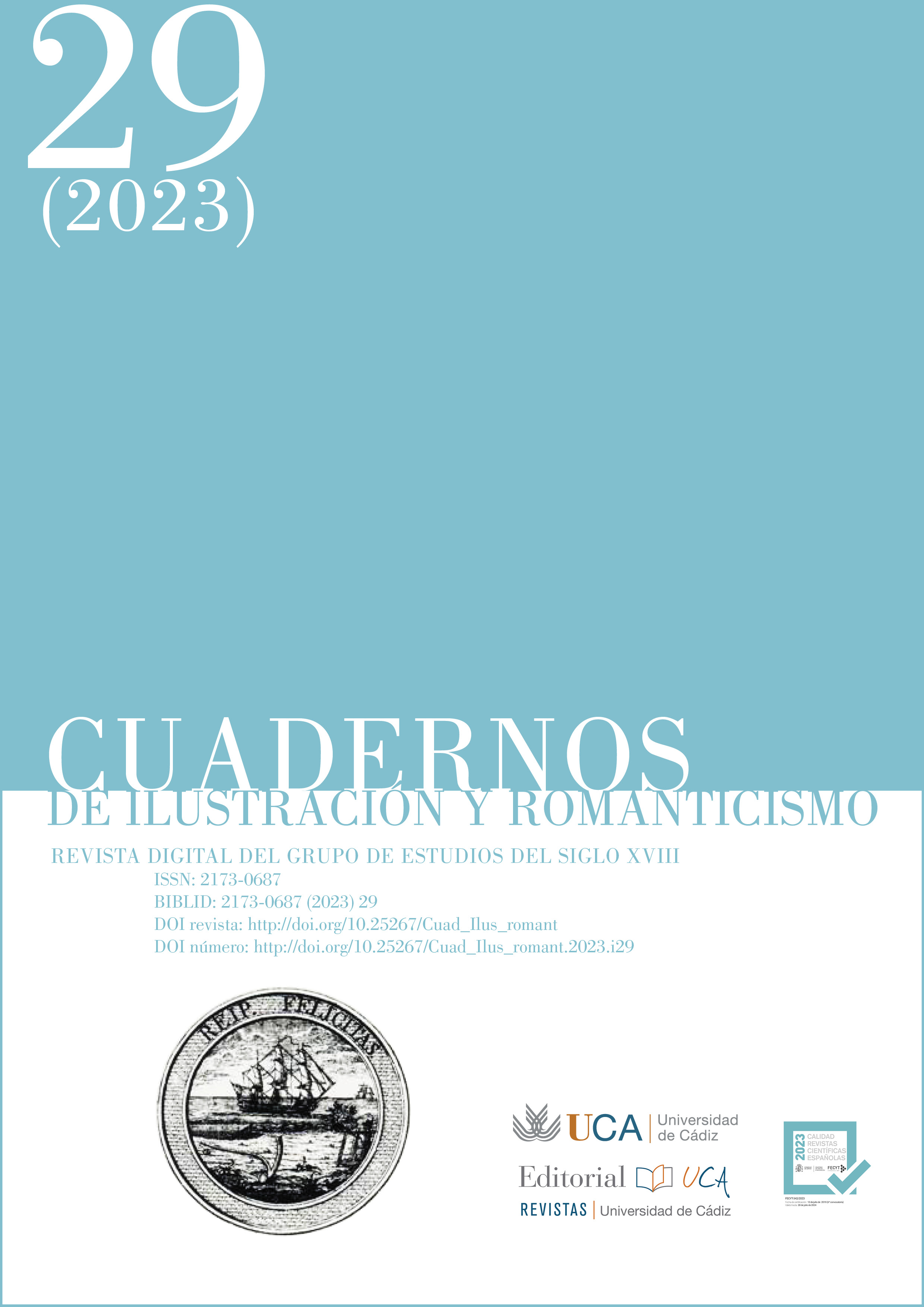Presentation. Information flows at the end of the First Globalisation

DOI
https://doi.org/10.25267/Cuad_Ilus_romant.2023.i29.01Info
Abstract
The papers of this issue show the different tools in which information was create in the Early Modern World. These articles examine that the same forces that created practices and adopted strategies to manage information were the same ones that generated more and more information. The diversity of approaches that are presented here in relation to the existence, acquisition, production and circulation of information flows aims to contribute to the complexity of the European empires of the eighteenth century as catalysts for information.
Downloads
How to Cite
License

This work is licensed under a Creative Commons Attribution-NonCommercial-NoDerivatives 4.0 International License.
The papers published in this journal are the property of Cuadernos de Ilustración y Romanticismo: the source must be cited whenever they are used.
The authors retain the copyright © and grant the journal the right to publish. They may host their work in the final published version on personal websites or websites intended for scientific dissemination, provided that they indicate the source.
References
Bayly, Christopher Alan (1997), Empire and Information. Intelligence Gathering and Social Communication in India, 1780-1870, Cambridge, Cambridge University Press.
Blair, Ann; Paul Duguid; Anja-Silvia Goeing; y Anthony Grafton (2021), Information: A Historical Companion, Princeton, Princeton University Press.
Brendecke, Ardnt (2012), Imperio e información: funciones del saber del dominio colonial español, Madrid, Iberoamericana.
Castells, Manuel (2001), La era de la información: economía, sociedad y cultura. La sociedad red, Madrid, Siglo xxi.
Castells, Manuel (2009), The Rise of the Network Society: The Information Age – Economy, Society and Culture, Oxford, Wiley-Blackwell.
De Vivo, Filippo (2007), Information and Communications in Venice: Rethinking Early Modern Politics, Oxford, Oxford University Press.
Darnton, Robert (2003), Edición y subversión: literatura clandestina en el Antiguo Régimen, México, Fondo de Cultura Económica.
Dooley, Brendan y Sabrina A. Baron (2001), The politics of information in early modern Europe, Londres y Nueva York, Routledge.
Dover, Paul M. (2021), The Information Revolution in Early Modern Europe, Cambridge, Cambridge University Press.
Dubcovsky, Alejandra (2016), Informed Power: Communication in the Early American South, Cambridge, Harvard University Press.
Higgs, Edward (2004), The Information State in England: the central collection of information on citizens since 1500, Basingtone, Palgrave Macmillan.
Headrick, Daniel R. (2000), When Information came of Age: Technologies of Knowledge in the Age of Reason and Revolution, 1700- 1850, Nueva York, Oxford University Press.
McNeill, J. R. y William H. McNeill (2004), Las redes humanas. Una historia global del mundo, Barcelona, Crítica.
Nunberg, Geoffrey (2021), «Information, Disinformation, Misinformation», en Information: A Historical Companion, Princeton, Princeton University Press.
Rodríguez Cancho, Miguel (1992), La información y el Estado: la necesidad de interrogar a los gobernadores a finales del Antiguo Régimen, Cáceres, Universidad de Extremadura.
Sellers-García, Sylvia (2014), Distance and Documents at the Spanish Empire’s Periphery, Stanford y California, Standford University Press.
Yun Casalilla, Bartolomé (2022), «Early modern Iberian empires, global history and the history of early globalization», Journal of Global History, v. 1, nº 23, pp. 539-561. https://doi.org/10.1017/S1740022822000122
Weller, Toni (2008), Information History: An Introduction: Exploring and Emergent Field, Oxford, Chandos Publising.





